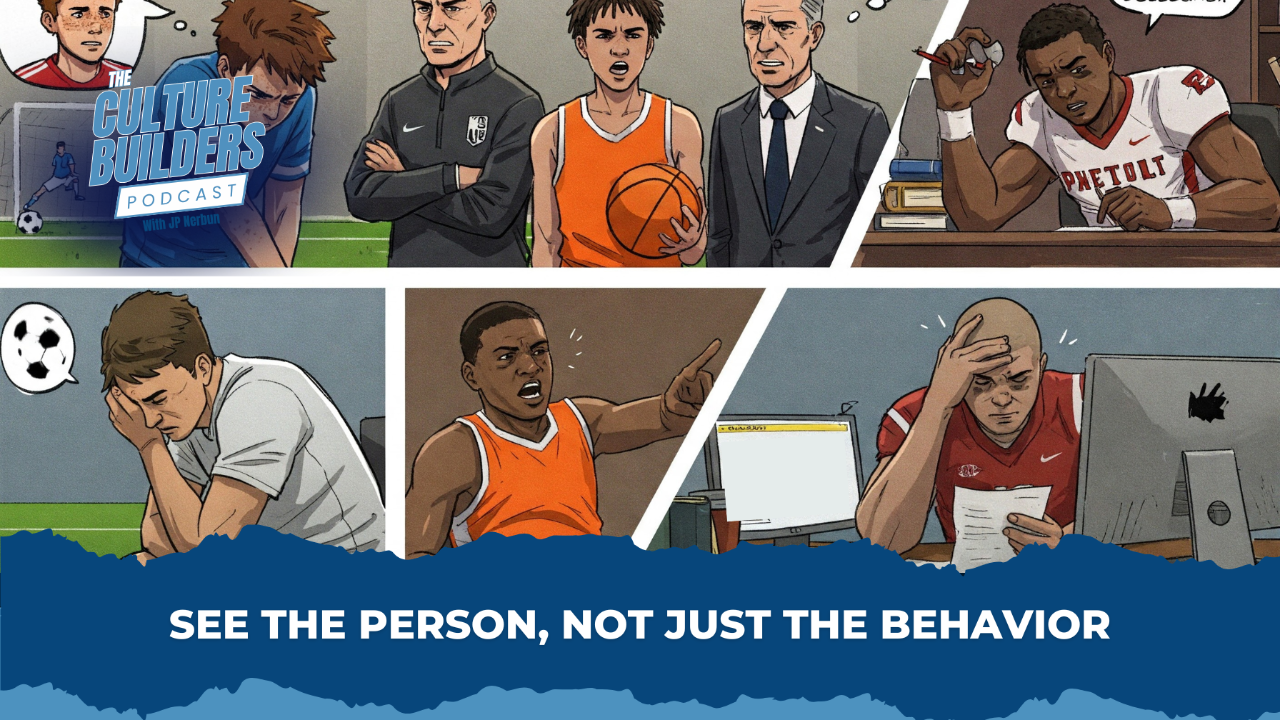See the Person, Not Just the Behavior

Underneath the selfish attitude, the poor effort, and the lack of discipline—there is always a good person. Yet, when coaches criticize and call out this behavior, when they harshly judge the individual instead of the behavior, it reinforces an identity of being selfish, lazy, and undisciplined. This approach might achieve temporary compliance, but it rarely facilitates lasting transformation.
Consider these scenarios:
- Scenario 1: The Compared Soccer Player: You're thirteen years old, and tryouts for the elite soccer team are this weekend. You've been practicing hard, but you're nervous. Your older sibling is a star player, and everyone keeps comparing you. Before practice, the coach says, “Your sister was one of the hardest working players I have ever coached. I’m excited to see what you’ve got!” Minutes into practice, you mess up a drill, and the coach gets on you and says, “You need to focus. Keep your eye on the ball.” Even though the coach's comment wasn't overtly harsh, the earlier comparison stings, and you feel embarrassed. Your face gets red, you avoid eye contact, and you start to just go through the motions, barely participating. You're completely withdrawn. What happens next? How does the coach respond?
- Scenario 2: The Frustrated Basketball Player: You're sixteen, and it's just a regular season game. You've missed two shots in a row, and on your third attempt, you take a contested jumper that misses. Your coach calls you over and says, "That was a terrible shot selection. You are being selfish. Stop settling for those outside shots." You're sick of being criticized every time you miss. You feel like the coach is always on your back. You go back out on the court and tell yourself to just play your game, block out the coach. The next time you get the ball, you drive and force a shot. What happens next? What does the coach do?
- Scenario 3: The Overwhelmed Football Player: You're a twenty-year-old college football player. You're a star on the field, but you're struggling to keep up academically. You know the team is counting on you, and if you don't do well in your classes, you'll be ineligible to play. Desperate and feeling overwhelmed, you use AI to write a paper. You think you've gotten away with it, but your professor flags the paper for plagiarism. Your coach receives an email informing him that you've been caught cheating. What happens next? What does your coach do?
How leaders respond to an individual shapes how they see themselves and influences the future they can envision. If we only focus on the behavior and miss the person, we might change the behavior temporarily, but we’ll never help facilitate real transformation.
Two Steps to See the Person:
- Look Beyond the Behavior: See the good person underneath the unwanted behaviors, and believe in who they can become. Ask yourself: What might be going on for this person? What are they experiencing?
- Treat Them as Someone Who Wants to Do Good: Start by treating them as someone who is good and wants to do good—speak to that belief of who they can and will become someday.
The Disappointed Senior
Imagine this: One of your players, a senior, has put in the work during the off-season. Despite their efforts, they don't make the starting lineup—talented underclassmen do. Disappointed and frustrated, they come to you and say, "I'm done. I'm quitting. All that work for nothing." How do you respond?
Avoid these responses:
- “Being a starter is overrated. You're being ridiculous. You need to toughen up.” (Dismissive and invalidating)
- “I can’t believe how selfish you are being. We have done so much for you these last four years, and you are just going to quit on the team because you don’t get what you want?” (Focuses on the coach's feelings, ignores the player's)
- “Well, that’s your choice—sorry you feel that way.” (Avoidant and unhelpful)
Instead, try: "Wow, this sounds really tough. I hear how disappointed and frustrated you are. Tell me more about what's making you feel this way." (Empathetic and encourages communication)
When athletes are struggling, facing adversity, these are identity-shaping moments. They are vulnerable, and the message we deliver has a big impact on how they see themselves. They are listening, even if it doesn't seem like it. If we want our athletes to believe in themselves, to grow into the people we know they can become, we need to speak to that belief—to who they could be, not just what they are doing.
A Real-World Example:
Recently, a coach I was working with made a change. In this very scenario, instead of telling a player to toughen up, he said: "I know this is hard for you, and I know you have the capacity to be resilient in this moment, to keep working hard, and to keep being a great teammate. We’re here to support you, and I know you are going to grow through this and set the standard for how we respond as a team when we don’t get what we want."
The rest of the season, this individual wasn't perfect. He didn't become best friends with the player who started over him. The coach could sense the difficulty. And yet—the senior player stuck it out, continued to work hard, and cheered his teammates on. It wasn’t perfect, but it was growth—exactly what the coach knew he was capable of.
Speak belief into who they could be—and they will start to believe in who they should be.
Join Our Weekly Newsletter
The most practical insights on leadership and culture...
- 3 Minute Weekly Tools & Tips
- Notes to the Coaching Culture Podcast
- FREE Chapter of The Culture System
We hate SPAM. We will never sell your information, for any reason.


